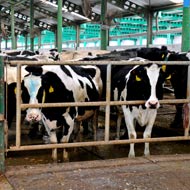Minister calls for restrictions on antibiotics

RUMA say that the livestock sector is actively looking at the lessons it can learn from other countries' experiences in reducing the use of antibiotics.
Defra shadow secretary Kerry McCarthy has called for “strong international action” on antibiotics, saying that their unnecessary use is reducing their effectiveness in human medicine.
The Labour minister made the assertion during the Antibiotics and Farming Conference in London last week (14 April).
But representatives from the farm industry argue that antibiotic resistance is mostly due to their use in human medicine, and not their use in the production of farm animals.
Ms McCarthy said: “We need strong international action to prevent antibiotics being given to animals who do not need them, alongside parallel efforts to reduce their use in human medicine.”
“Without concerted action, we risk losing effective antibiotics, which could severely affect our agricultural industry and our food security,” she added.
“Some argue that preventative antibiotic use in intensive farming improves efficiency and helps consumers to access cheap meat. But it is clear now that this is coming at an unaffordable cost.
“Voluntary schemes rarely drive action at the pace needed. The government and regulators should act now to put the principles of 'responsible use' into practice.”
In a statement the Responsible Use of Medicines in Agriculture Alliance (RUMA), who represent the livestock supply chain, said that blame should not be solely directed at farmers.
‘Recent reports have indicated antibiotic resistant bacteria in humans and animals is - for the most part - genetically different. Another study has confirmed farm animal use could be responsible for as few as one in every 370 clinical cases,’ said RUMA.
‘Despite this, resistance is a threat in animals too and the farming industry, as well as looking after the health of horses and pet, must "do its bit" to control spread.’
RUMA say that the livestock sector is actively looking at the lessons it can learn from other countries' experiences in reducing the use of antibiotics, but adds that direct comparisons 'are never simple'.
In the Netherlands, the government invested heavily to allow its pig farmers to build new high-health premises. In reducing its antibiotic usage by almost 60 per cent, the country is now at approximately the same level of use as the UK.



 The Federation of Independent Veterinary Practices (FIVP) has announced a third season of its podcast, Practice Matters.
The Federation of Independent Veterinary Practices (FIVP) has announced a third season of its podcast, Practice Matters.